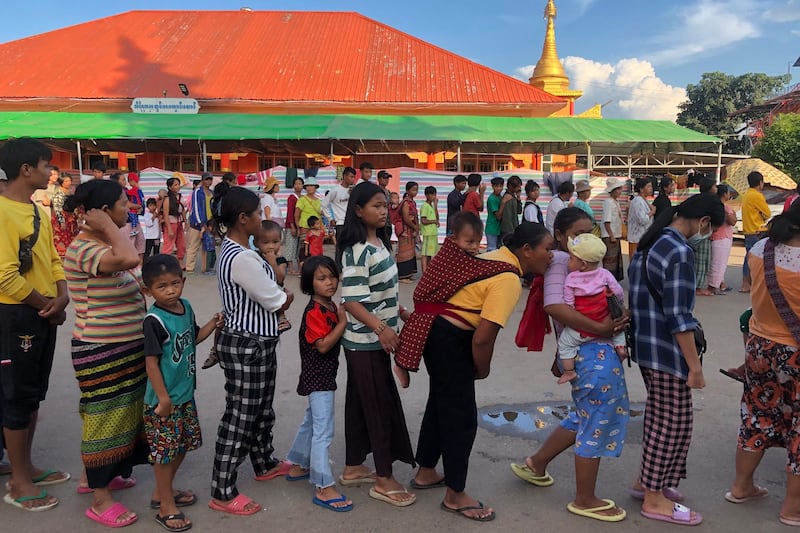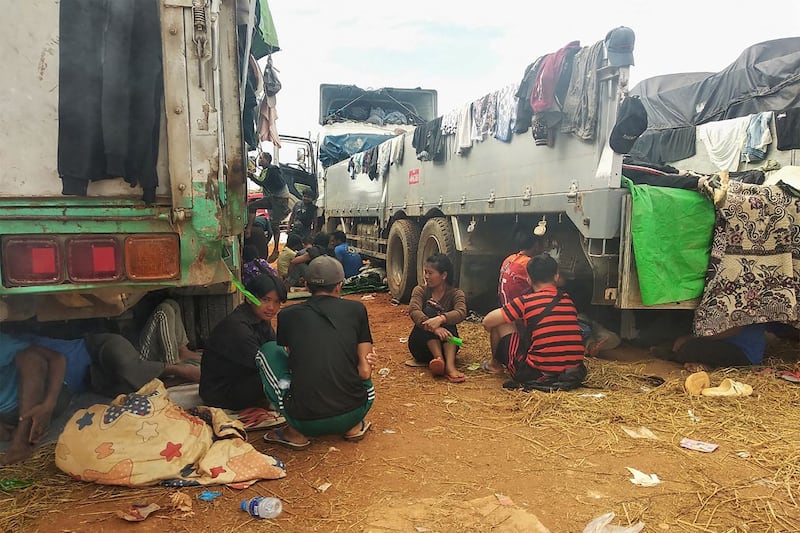Myanmar’s civil war has displaced more than 2.6 million people, including 660,000 who recently fled their homes after intensified fighting since October between junta troops and armed ethnic groups, the U.N.’s Office for the Coordination of Humanitarian Affairs said.
Armed clashes, air strikes, the planting of landmines, arbitrary arrests and road blockades have caused a surge in civilian casualties, the office said in a Dec. 15 situation report.
At the same time, the transportation of food and shelters for internally displaced persons are being restricted, according to the United Nations Office for the Coordination of Humanitarian Affairs, or UNOCHA.
“Interruptions to phone and internet services are impacting on the sharing of civilian safety information and humanitarian operations,” the report said.
“The lack of humanitarian and commercial access to transport routes is creating a scarcity of food, shortages of essential household items, soaring commodity prices and a fuel crisis in affected areas.”

On Oct. 27, the “Three Brotherhood” Alliance of the Arakan Army, the Myanmar National Democratic Alliance Army, or MNDAA, and the Ta’ang National Liberation Army, or TNLA, launched an offensive against the military in northern Shan state dubbed “Operation 1027.”
The rebels say they have made notable gains against the military in several key cities in Shan state and claim to have captured more than 170 military outposts since the start of the campaign.
But the intensification of fighting has caught civilians in the crossfire, contributing to the huge increase in displaced communities nationwide.
No safe travel
Rescuing those trapped by conflict has become more challenging than providing people with food and shelter, said an aid worker who is assisting displaced people in northern Shan state.
“The armed clashes and people should be seen separately,” the worker said. “In any battle, it is more important to relocate them than to provide food. We relocated people first to the camp, and then managed food for them.”
The MNDAA, which has controlled parts of Hsenwi township in northern Shan state since late October, recently destroyed the bridge between Hsenwi and Lashio, the state’s largest municipality.
More than 1,300 internally displaced people, or IDPs, have been trapped at Kyaung Kham village’s monastery in Hsenwi, not far from where junta troops are located.

A person who fled from Hsenwi township said people aren’t safe when traveling and are facing various other challenges.
“The ways from Hsenwi to Lashio or other towns are dangerous,” the resident said. “We have some difficulties in living and buying food while we are living in Lashio.”
UNOCHA’s report also highlighted recent fighting in Rakhine and Chin states in western Myanmar that has forced more than 110,000 people to flee their homes.
Junta chief visits IDPs
Both the military junta and the resistance forces should stop blocking any transportation of humanitarian aid, said Kyaw Win, the executive director of Burma Human Rights Network.
“We have known that the military council is randomly carrying out artillery attacks on villages. They also blocked the roads,” he said. “That is a violation of international law. The transportation of humanitarian assistance should not be restricted.”
Junta chief Senior Gen. Min Aung Hlaing and humanitarian groups have provided assistance to displaced people in Shan state, junta spokesman Maj. Gen. Zaw Min Tun said on the military-owned Myawady Television on Dec. 12.
“Min Aung Hlaing visited and comforted the war-displaced persons during his tour to northern Shan state,” he said. “He talked to the displaced persons in Hsenwi and Lashio townships. They have some hardships at temporary shelters.”
The junta is working to improve education, health and peace for the IDPs, Zaw Min Tun said, although he didn’t specify where that assistance would be directed.
UNOCHA’s office in Myanmar didn’t immediately respond to an email sent on Monday requesting more information on humanitarian assistance being provided to IDPs in Myanmar.
Translated by Aung Naing. Edited by Matt Reed and Malcolm Foster .
